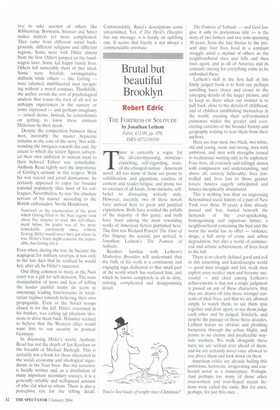Brutal but beautiful Brooklyn
Robert Edric
THE FORTRESS OF SOLITUDE by Jonathan Lethem Faber, £12.99, pp. 470, ISBN 0571219330 There is currently a vogue for the all-encompassing, minutiaecrunching, self-regarding, stateof-the-changed-nation American novel. All too many of these are prone to solidification and gigantism, careless of content and reader-fatigue, and prone too to excesses of all kinds, from intrusive selfbelief to distracting writerly style. However, recently, two of these novels have arrived here to great and justified expectation. Both have avoided the pitfalls of the majority of this genre, and both have been among the most rewarding works of American fiction published here. The first was Richard Powers' The Time of Our Singing; the second, just arrived, is Jonathan Lethem's The Fortress of Solitude.
Readers familiar with Lethem's Motherless Brooklyn will understand that the bulk of his work is a continuous and engaging saga dedicated to that small part of the world which has nurtured him, and which he knows completely in all its dirty, striving, complicated and disappointing detail. The Fortress of Solitude — and God forgive it only its portentous title — is the story of two fathers and two sons spanning 30 years, from the late Sixties to the present day: four lives lived in a constant struggle amid a myriad of others as the neighbourhood rises and falls and then rises again, and as all of America and its constant craving for everything come to be embodied there.
Lethem's skill in the first half of this finely judged book is to hold our perhaps unwilling faces closer and closer to the emerging details of the larger picture, and to keep us there when our instinct is to pull back: close to the details of childhood, and of children establishing themselves in the world, creating their self-contained existences within the greater and evercircling currents of the broader history and geography waiting to tear them from their anchors.
Here are four men, two black, two white, old and young, weak and strong, men with ambition, and men with strengths turned to weaknesses waiting only to be exploited. Four lives, all concisely and tellingly drawn with compassion and understanding, and above all, entirely believable; lives controlled and lives lost to those greater forces; futures eagerly anticipated and futures inexplicably abandoned.
This is nothing less than an engrossing fictionalised social history of a part of New York over those 30 years, a time already passed and lost, buried beneath the demands of the ever-quickening, homogenising and rapacious future, a neighbourhood containing the best and the worst the world has to offer — violence, drugs, a full array of crime and urban degradation, but also a world of commercial and artistic achievement, of lives lived to the full.
There is no clearly defined good and evil in this unsettling and kaleidoscopic world — good men struggle and fail, weak men exploit even weaker men and become successful — and chief among Lethern's achievements is that not a single judgment is passed on any of these characters, that they are drawn off into those stronger currents of their lives, and that we are allowed simply to watch them, to see them spin together and draw apart, to see them judge each other and be judged. Similarly, and despite the passage of those three decades, Lethem leaves no obvious and plodding footprints through the urban blight, and points to no clumsy and predictable wayside markers. We walk alongside these men; we are seldom ever ahead of them; and we are certainly never once allowed to rise above them and look down on them.
American critics are already hailing this ambitious, luminous, invigorating and exuberant novel as a masterpiece. Perhaps. And perhaps too many of those other over-written and over-hyped recent fictions were called the same. But for once, perhaps, for just this once...


























































 Previous page
Previous page